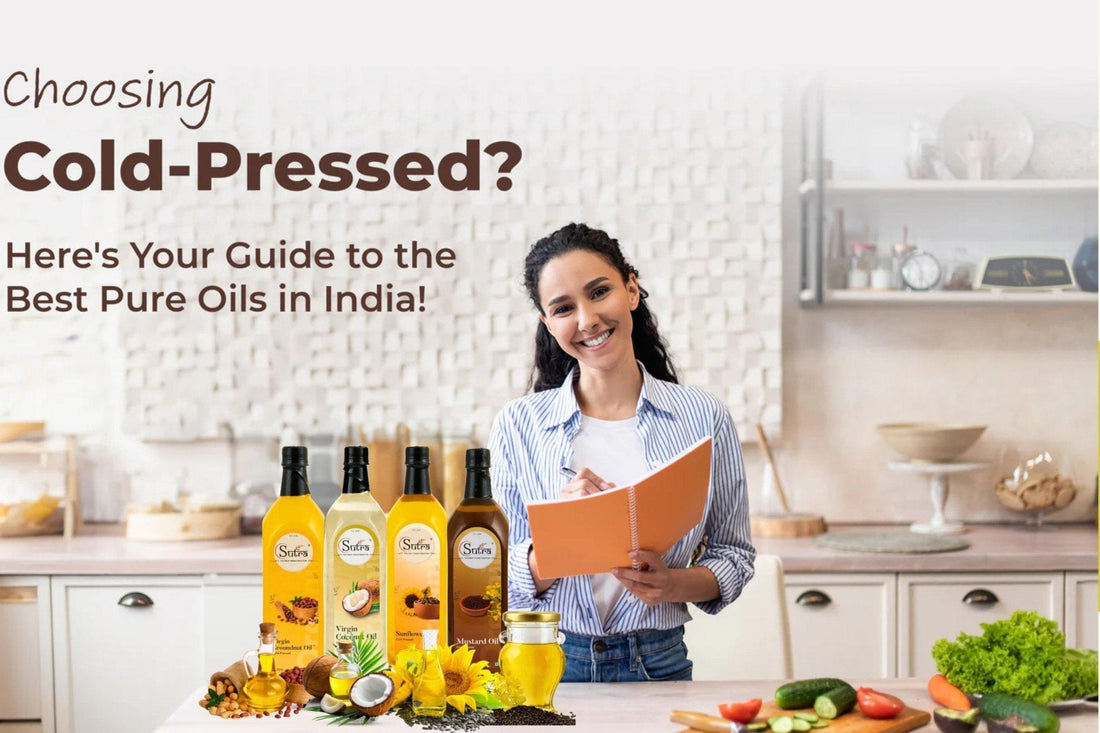Farm to Kitchen: How Your Cold Pressed Oil is Actually Made in India

Farm to Kitchen: How Your Cold Pressed Oil is Actually Made in India
Have you ever wondered how the bottle of cold pressed coconut oil or groundnut oil on your kitchen shelf came into existence? It’s not just oil; it's a story of tradition, purity, and natural farming. Let’s trace the journey from the farms to your kitchen.
The Cold Pressed Oil Process – From Seed to Bottle
Cold pressed oil is extracted using a traditional wooden press (called “marachekku” in Tamil and “ghani” in Hindi), a method that dates back hundreds of years. Unlike refined oils, no heat or chemicals are used, preserving nutrients and flavor.
1. Sourcing the Best Seeds
The journey begins with sourcing high-quality, naturally grown seeds – be it groundnuts, sesame, coconut, or sunflower. Ethical brands often work directly with local farmers across Tamil Nadu, Karnataka, and Andhra Pradesh to procure non-GMO, chemical-free produce.
2. Cleaning & Sun Drying
Seeds are thoroughly cleaned to remove dirt and impurities. After that, they’re sun-dried for 2–3 days to reduce moisture, which is crucial for better oil yield and shelf life.
3. Traditional Wooden Press Extraction
Seeds are loaded into the wooden chekku or bull-driven ghani. The slow mechanical crushing (at under 40°C) ensures oil is extracted without destroying vitamins or antioxidants. The wood used (often vaagai or neem) helps retain natural flavor.
4. Filtration (No Chemicals Involved)
Once the oil is extracted, it’s allowed to settle for 2–3 days. Natural sedimentation separates the solids. No refining, no bleaching – just pure, aromatic oil filtered using a cloth or natural mesh.
5. Packaging in Eco-Safe Bottles
The final oil is bottled in food-grade glass or BPA-free PET containers. Many conscious brands are moving toward sustainable packaging to reduce plastic waste.
Why the Traditional Method Matters
- No Heat or Chemicals: Nutrients like Vitamin E, Omega-3, and antioxidants are preserved.
- Better Taste & Aroma: Especially noticeable in traditional recipes like dosa, pongal, poha, or thecha.
- Supports Rural Economy: Buying cold pressed oils often supports small farmers and local oil mills.
Behind-the-Scenes: A Day at a Chekku Oil Mill
Most traditional oil mills are simple setups in village outskirts. One can hear the rhythmic sound of the rotating chekku, smell the fresh oil in the air, and witness the entire process with transparency. Customers in places like Bangalore, Mysore, Coimbatore, and Hyderabad are increasingly visiting these units or ordering online directly from mills.
Choosing the Right Cold Pressed Oil Brand
Look for the following before buying:
- Check if the oil is wood-pressed or marachekku-pressed.
- Ensure it’s made from single-origin seeds without blends or additives.
- Prefer brands that show transparency via process videos or traceability tools.
Conclusion: Purity That Begins at the Farm
Cold pressed oils are not just a health choice but also a connection to our roots. Every drop of oil carries the hard work of Indian farmers, the legacy of traditional methods, and the promise of clean nutrition. Switch to real wood pressed oils and bring back the wisdom your grandmother trusted.
Explore: Buy Cold Pressed Oils in Bangalore | Cold Pressed vs Refined Oils


